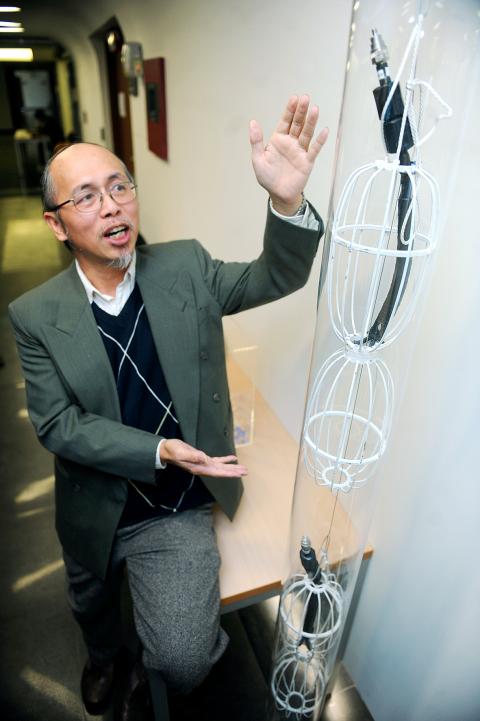Taiwanese researchers will collaborate with their counterparts in several countries to launch the world’s largest neutrino observatory in Antarctica in four years, a project that could help scientists better understand the origin of the universe, researchers said yesterday.
The NT$240 million (US$7.9 million) observatory, which will cover an area of 100km2, will involve universities in the US, Europe, Japan and Taiwan.
When completed, it will be much larger than the IceCube observatory, currently the largest neutrino detector in the world, with an area of 1km2.

Photo: Liao Chen-huei, Taipei Times
This means that the new observatory will have a detection capacity 200 times that of the IceCube, the Taiwanese team said at a press conference in Taipei.
“The observatory will enable scientists to detect higher-energy neutrinos from distant galaxies,” said Huang Ming-huey (黃明輝), a professor and member of the research team, which has about 10 associates.
“These neutrinos can tell us what happened in the early universe and help us understand how the universe came into being,” he said.
Unlike the particles that make up light, radio waves and X-rays, neutrinos can penetrate anything, making them ideal for the observation of distant areas of the universe, Huang said.
Radio antennas are buried 200m deep in the Antarctic ice sheet at an elevation of 3,000m to measure the radio frequency of radiation emitted during the interaction of the neutrinos deep in the ice sheet.
The Taiwanese team, led by Chen Pi-sin (陳丕燊) from National Taiwan University (NTU), will provide 10 of the 37 antenna stations that will form the hexagonal observatory and will be responsible for the design and production of the antenna detectors.
The installation of the first station began early this month, with six more expected to be completed within the next two years by the Taiwanese team, Huang said.
Chen, who is currently in Antarctica taking part in the installation of the station, told the media through a video conference that the project was being carried out at the Antarctic “because the ice here is 3,000m thick.”
He said ice is an ideal medium for the detection of neutrinos.
However, he said the extremely cold weather has been the biggest challenge for the researchers.
After the observatory is completed, the team will spend at least five to 10 years collecting data, Chen said.
“We hope to make some discoveries,” he added.
The Askaryan Radio Array observatory project began in 2009. Taiwan’s government-operated National Science Council and NTU’s Leung Center for Cosmology and Particle Astrophysics are co-funding the Taiwanese contribution.
The Leung Center for Cosmology and Particle Astrophysics was established in 2007 by a donation of NT$205 million from C.C. Leung (梁次震), founder and vice chairman of Quanta Computer Inc (廣達電腦), the world’s largest contract notebook PC maker.
Leung was Chen’s classmate in the NTU physics department. While a student at NTU, Leung set up an astronomy club with his classmates because of his strong interest in astrophysics and high energy physics.

France cannot afford to ignore the third credit-rating reduction in less than a year, French Minister of Finance Roland Lescure said. “Three agencies have downgraded us and we can’t ignore this cloud,” he told Franceinfo on Saturday, speaking just hours after S&P lowered his country’s credit rating to “A+” from “AA-” in an unscheduled move. “Fundamentally, it’s an additional cloud to a weather forecast that was already pretty gray. It’s a call for lucidity and responsibility,” he said, adding that this is “a call to be serious.” The credit assessor’s move means France has lost its double-A rating at two of the

AI BOOST: Although Taiwan’s reliance on Chinese rare earth elements is limited, it could face indirect impacts from supply issues and price volatility, an economist said DBS Bank Ltd (星展銀行) has sharply raised its forecast for Taiwan’s economic growth this year to 5.6 percent, citing stronger-than-expected exports and investment linked to artificial intelligence (AI), as it said that the current momentum could peak soon. The acceleration of the global AI race has fueled a surge in Taiwan’s AI-related capital spending and exports of information and communications technology (ICT) products, which have been key drivers of growth this year. “We have revised our GDP forecast for Taiwan upward to 5.6 percent from 4 percent, an upgrade that mainly reflects stronger-than-expected AI-related exports and investment in the third

Mercuries Life Insurance Co (三商美邦人壽) shares surged to a seven-month high this week after local media reported that E.Sun Financial Holding Co (玉山金控) had outbid CTBC Financial Holding Co (中信金控) in the financially strained insurer’s ongoing sale process. Shares of the mid-sized life insurer climbed 5.8 percent this week to NT$6.72, extending a nearly 18 percent rally over the past month, as investors bet on the likelihood of an impending takeover. The final round of bidding closed on Thursday, marking a critical step in the 32-year-old insurer’s search for a buyer after years of struggling to meet capital adequacy requirements. Local media reports

RARE EARTHS: The call between the US Treasury Secretary and his Chinese counterpart came as Washington sought to rally G7 partners in response to China’s export controls China and the US on Saturday agreed to conduct another round of trade negotiations in the coming week, as the world’s two biggest economies seek to avoid another damaging tit-for-tat tariff battle. Beijing last week announced sweeping controls on the critical rare earths industry, prompting US President Donald Trump to threaten 100 percent tariffs on imports from China in retaliation. Trump had also threatened to cancel his expected meeting with Chinese President Xi Jinping (習近平) in South Korea later this month on the sidelines of the APEC summit. In the latest indication of efforts to resolve their dispute, Chinese state media reported that